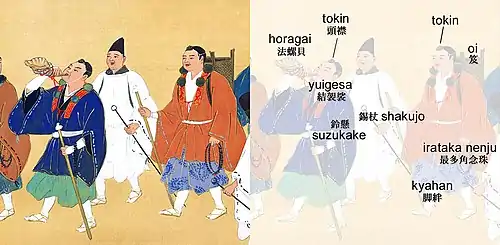Yamabushi (山伏, one who prostrates himself on the mountain) are Japanese mountain ascetic hermits.[1] They are generally part of the syncretic shugendō religion, which includes Tantric Buddhist, Shinto, and Japanese Taoist elements.[2]
Their origins can be traced back to the solitary Yama-bito and some hijiri (聖) (saints or holy persons) of the eighth and ninth centuries.[3]
According to American writer Frederik L. Schodt:
These positively medieval-looking nature worshipers carry metal staves and conch shells and wear straw sandals and sometimes a hemp cloth over-robe with the Heart Sutra written on it. They follow a mixture of esoteric or tantric Buddhism mixed with Shinto, the native animistic religion of Japan.[4]
Clothing and items
Yamabushi usually wear and bring the following clothes and items with them:[5][6][7]
- Yuigesa (結袈裟), a harness or sash adorned with pom-poms
- Kyahan (脚絆), sandals made from straw
- Tokin (頭巾) which is a small hat-like adornment worn at the front of the head
- Shakujō (錫杖), a metal rod, held in their hands
- Oi (笈), backpack
- Horagai (法螺貝), a conch shell, which they blow like a horn to bind evil spirits
See also
Further reading
- Ratti, Oscar; Westbrook, Adele (1999). Secrets of the Samurai: A Survey of the Martial Arts of Feudal Japan. Edison, New Jersey: Castle Books. ISBN 0785810730.
- Powell, Steve John; Cabello, Angeles Marin (May 12, 2021). "Japan's Mountain Ascetic Hermits". British Broadcasting Corporation.
References
- ↑ Nelson, Andrew Nathaniel (1995). The Original Modern Reader's Japanese-English Character Dictionary (Classic ed.). Rutland, Vermont: C. E. Tuttle Co. pp. 134, 346. ISBN 9780804819657.
- ↑ "Exoteric Buddhism, Esoteric Buddhism, and Shugendo - 顕教・密教・修験道". www.tendai-jimon.jp. Tendaijimon Sect. Archived from the original on 2020-12-21. Retrieved 31 January 2021.
- ↑ Blacker, Carmen (1999). The Catalpa Bow: A Study of Shamanistic Practices in Japan (3rd ed.). Richmond, Virginia: Japan Library. pp. 165–167. ISBN 1873410859.
- ↑ Schodt, Frederik L. (2020). My Heart Sutra. Berkeley (Ca): Stone Bridge Press. ISBN 978-1-61172-062-4.
- ↑ 小項目事典,世界大百科事典内言及, 日本大百科全書(ニッポニカ),百科事典マイペディア,旺文社日本史事典 三訂版,デジタル大辞泉,事典・日本の観光資源,世界大百科事典 第2版,ブリタニカ国際大百科事典. "山伏(やまぶし)とは? 意味や使い方". コトバンク (in Japanese). Retrieved 2023-06-02.
{{cite web}}: CS1 maint: multiple names: authors list (link) CS1 maint: numeric names: authors list (link) - ↑ Cabello, Steve John Powell & Angeles Marin. "Japan's mountain ascetic hermits". www.bbc.com. Retrieved 2023-06-02.
- ↑ Yamabushi Ascetic Monk, retrieved 2023-06-02
